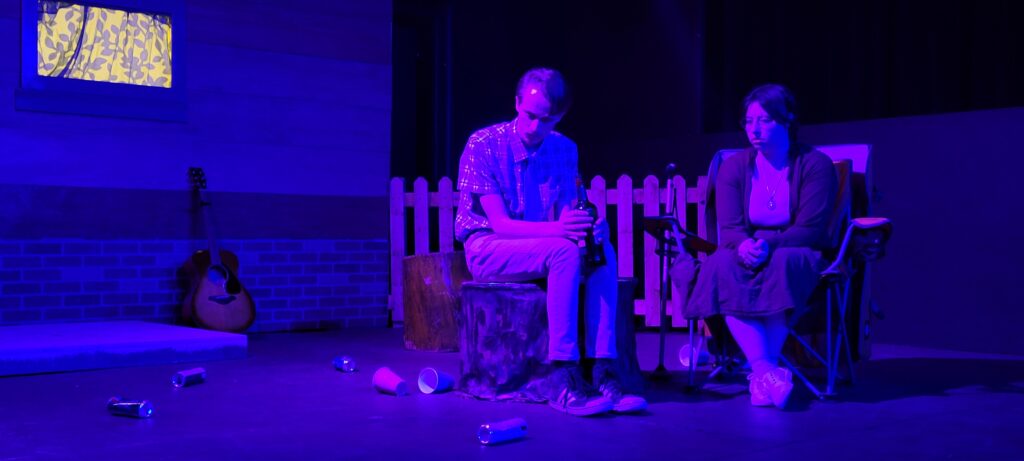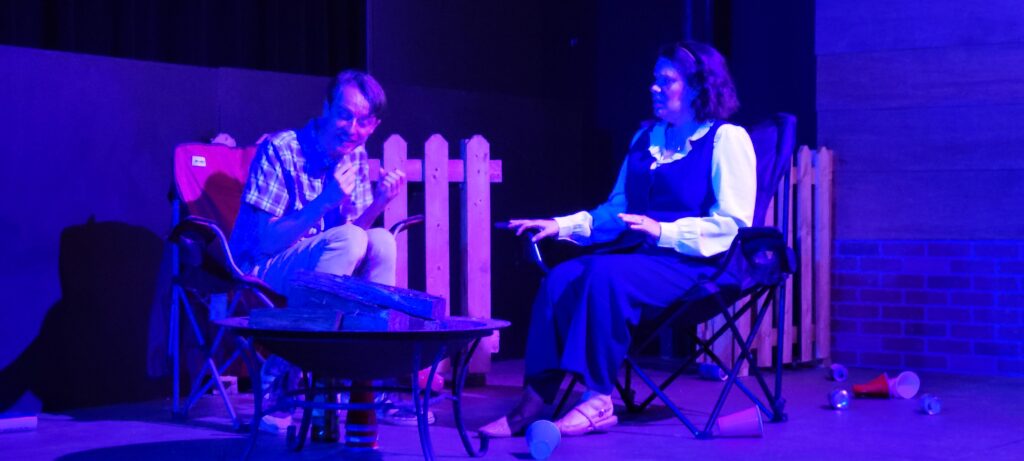By JULES SHINKLE
BG Independent News
Picture a conversation between old friends, reminiscing over the good ol’ days and catching up with what’s new. The warmth of shared nostalgia fills the room, reassuring everyone that even though time has passed, the chemistry remains the same.
Then, a slight change of subject: current events, politics, religion. Voices rise and sides are declared. As it turns out, friends can have strongly held convictions that run perpendicular to each other.
Even after tempers have settled down, the vibe has soured irreparably – things were said that couldn’t be taken back. How disparate can a friend group’s beliefs and values be before the seams come apart? How should one react after seeing a loved one at their worst?
“Heroes of the Fourth Turning,” written by Will Arbery, is being performed by the Black Swamp Players with Fran Martone as director. The play captures the visceral discomfort of being a bystander to bitter divisiveness.
People can catch the production this weekend and the next (Sept. 26-28 and Oct. 3-5) at 115 E Oak St. in Bowling Green. Showtimes are at 7:30 p.m. on Friday and Saturday and 1:30 p.m. on Sunday. Click here for tickets.
 Kevin (Nicholas Yates) and Emily (Nikki Fetters) share a private moment.
Kevin (Nicholas Yates) and Emily (Nikki Fetters) share a private moment.
Our eponymous heroes are alumni of Transfiguration College of Wyoming, a small liberal arts school whose curriculum verses students in Catholicism, the works of Plato and Heidegger, and climbing mountains. It’s an institution explicitly guided by conservative values, as are our four main characters.
Four old friends are celebrating the inauguration of the college’s first woman president two days before the August 2017 total solar eclipse. Their night begins innocuously enough, drinking and catching up under a curtain of stars. Then, the conversation turns to current events, politics, religion.
One of the play’s greatest strengths is its characterization. Each character is vividly unique, unable to be slotted into neat archetypes. Throughout the course of the play, detailed portraits of the friends are drawn through the ideologies they espouse. Nobody, however, is a paragon of the values they preach; “Heroes of the Fourth Turning” does a remarkable job of demonstrating the difficulty involved with being consistent with one’s ideals.
Justin (Ryan Walsh) is the party’s host and the most soft-spoken of the crowd. He came to Transfiguration College at a later age, looking to turn over a new leaf. In the years since the friends have last hung out, Justin has picked up a country drawl that the others get a kick out of.
He’s plagued with existential concern for humanity, carrying a worrisome burden that he’s not keen to share with others.
Emily (Nikki Fetters) is also a local, but mostly because her parents both work for Transfiguration College. In fact, her mom, Gina (Gabrielle Southwell) was inaugurated as the college’s president just hours before the play’s start. She struggles with an unnamed chronic condition and feels compelled to keep the pain to herself. Emily is prone to minimizing herself, repelled by others’ attention but compelled to speak when her friends speak out of line.
Teresa (Elizabeth Coronado) is an ambitious ultraconservative firebrand trying to make a name for herself through her political writing. More eager to schmooze with Gina than engage with her friends, Teresa’s relationship to the group is tentative at best. The friends mostly act as her sounding board for well-rehearsed diatribes on minorities. Her confidence and sharp articulation allow her to debate ideas fiercely.
 Kevin spirals in front of Teresa (Elizabeth Coronado).
Kevin spirals in front of Teresa (Elizabeth Coronado).
Kevin (Nicholas Yates) is the friend group’s loose cannon. Because of his apparent emotional instability, he teeters between sheepish and crass. Kevin broaches difficult topics as a result of his habit of speaking completely unfiltered. Though he is helplessly awkward, there’s a charming quality to his commitment to honesty. Yates embodies this character in a remarkably compelling way – rarely does a character make the room deeply uncomfortable while still remaining sympathetic.
Their conversation over the course of the night reveals bit by bit how each character is a foil to the other. While they have much in common, many of their differences seem irreconcilable. The conflict at hand speaks to a very grounded, true-to-life depiction of friends engaged in conflict.
“Heroes of the Fourth Turning” deals with what conservative ideology looks like on a spectrum. While it might be tempting to interpret the characters as representatives of their corresponding factions, much of the play’s success comes from its commitment to dramatic portrayals of complicated individuals.